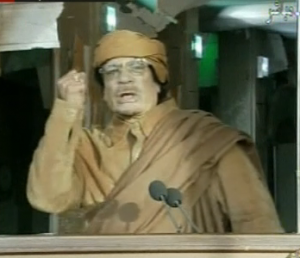Qaddafi Forces Hit Civilian Areas
Military forces loyal to Col. Muammar el-Qaddafi, who have surrounded this city and vowed to crush its anti-Qaddafi rebellion, have been firing into residential neighborhoods with heavy weapons, including cluster bombs that have been banned by much of the world and ground-to-ground rockets, according to the accounts of witnesses and survivors and physical evidence on the ground.
Such “indiscriminate” weapons, which strike large areas with a dense succession of high-explosive munitions, by their nature cannot be fired precisely, and when fired into populated areas place civilians at grave risk.
The use of such weapons could add urgency to the arguments by some countries in NATO, principally Britain and France, that the alliance needs to step up attacks on the Qaddafi forces, to better fulfill the United Nations mandate to protect civilians. And it could place pressure on the United States, which pulled back air power from the war when it ceded control of the campaign to NATO earlier this month.
When asked about the weaponry at a news conference in Berlin, Secretary of State Hillary Rodham Clinton said she was “not aware” of the specific use of cluster munitions in Misurata, but said, “I’m not surprised by anything that Colonel Qadaffi and his forces do.”
She added: “That is worrying information. And it is one of the reasons the fight in Misurata is so difficult, because it’s at close quarters, it’s in amongst urban areas and it poses a lot of challenges to both NATO and to the opposition.”
The cluster munitions were visible in use late Thursday night, in the form of what appeared to be 120-millimeter mortar rounds that burst in the air over the city, scattering high-explosive bomblets below.
Remnants of expended shells, examined and photographed by The New York Times, show the rounds to be MAT-120 cargo mortar projectiles, each of which carries and distributes 21 smaller submunitions designed both to kill people and penetrate light armor.


